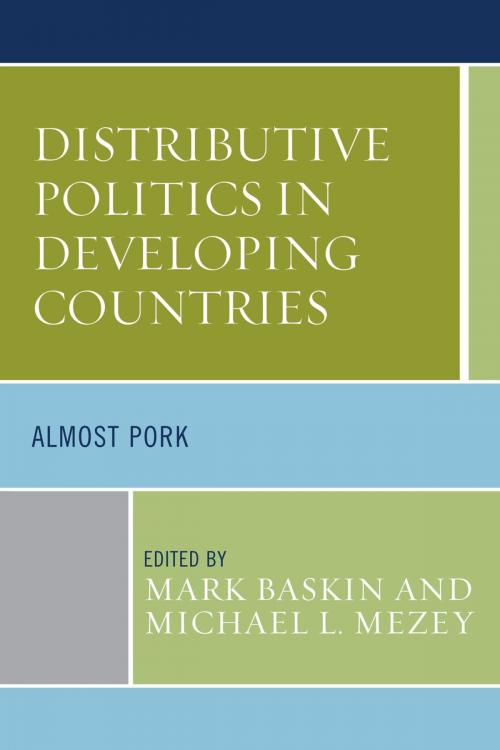Distributive Politics in Developing Countries
Almost Pork
Nonfiction, Social & Cultural Studies, Political Science, Government, Social Policy, Democracy, International, International Relations| Author: | Joel D. Barkan, Horace Bartilow, Mark Baskin, Harry Blair, Diana Evans, Nelson Kasfir, Robert Mattes, Michael L. Mezey, David Ndii, Steven Hippo Twebaze | ISBN: | 9780739180693 |
| Publisher: | Lexington Books | Publication: | October 23, 2014 |
| Imprint: | Lexington Books | Language: | English |
| Author: | Joel D. Barkan, Horace Bartilow, Mark Baskin, Harry Blair, Diana Evans, Nelson Kasfir, Robert Mattes, Michael L. Mezey, David Ndii, Steven Hippo Twebaze |
| ISBN: | 9780739180693 |
| Publisher: | Lexington Books |
| Publication: | October 23, 2014 |
| Imprint: | Lexington Books |
| Language: | English |
This book explores the increasing use of Constituency Development Funds (CDFs) in emerging democratic governments in Africa, Asia, the Caribbean, and Oceania. CDFs dedicate public money to benefit parliamentary constituencies through allocations and/or spending decisions influenced by Members of Parliament (MPs). The contributors employ the term CDF as a generic term although such funds have a different names, such as electoral development funds (Papua New Guinea), constituency development catalyst funds (Tanzania), or Member of Parliament Local Area Development Fund (India), etc.
In some ways, the funds resemble the ad hoc pork barrel policy-making employed in the U.S. Congress for the past 200 years. However, unlike earmarks, CDFs generally become institutionalized in the government’s annual budget and are distributed according to different criteria in each country. They enable MPs to influence programs in their constituencies that finance education, and build bridges, roads, community centers, clinics and schools. In this sense, a CDF is a politicized form of spending that can help fill in the important gaps in government services in constituencies that have not been addressed in the government’s larger, comprehensive policy programs.
This first comprehensive treatment of CDFs in the academic and development literatures emerges from a project at the State University of New York Center for International Development. This project has explored CDFs in 19 countries and has developed indicators on their emergence, operations, and oversight. The contributors provide detailed case studies of the emergence and operations of CDFs in Kenya, Uganda, Jamaica, and India, as well as an analysis of earmarks in the U.S. Congress, and a broader analysis of the emergence of the funds in Africa. They cover the emergence, institutionalization, and accountability of these funds; analyze key issues in their operations; and offer provisional conclusions of what the emergence and operations of these funds say about the democratization of politics in developing countries and current approaches to international support for democratic governance in developing countries.
This book explores the increasing use of Constituency Development Funds (CDFs) in emerging democratic governments in Africa, Asia, the Caribbean, and Oceania. CDFs dedicate public money to benefit parliamentary constituencies through allocations and/or spending decisions influenced by Members of Parliament (MPs). The contributors employ the term CDF as a generic term although such funds have a different names, such as electoral development funds (Papua New Guinea), constituency development catalyst funds (Tanzania), or Member of Parliament Local Area Development Fund (India), etc.
In some ways, the funds resemble the ad hoc pork barrel policy-making employed in the U.S. Congress for the past 200 years. However, unlike earmarks, CDFs generally become institutionalized in the government’s annual budget and are distributed according to different criteria in each country. They enable MPs to influence programs in their constituencies that finance education, and build bridges, roads, community centers, clinics and schools. In this sense, a CDF is a politicized form of spending that can help fill in the important gaps in government services in constituencies that have not been addressed in the government’s larger, comprehensive policy programs.
This first comprehensive treatment of CDFs in the academic and development literatures emerges from a project at the State University of New York Center for International Development. This project has explored CDFs in 19 countries and has developed indicators on their emergence, operations, and oversight. The contributors provide detailed case studies of the emergence and operations of CDFs in Kenya, Uganda, Jamaica, and India, as well as an analysis of earmarks in the U.S. Congress, and a broader analysis of the emergence of the funds in Africa. They cover the emergence, institutionalization, and accountability of these funds; analyze key issues in their operations; and offer provisional conclusions of what the emergence and operations of these funds say about the democratization of politics in developing countries and current approaches to international support for democratic governance in developing countries.















